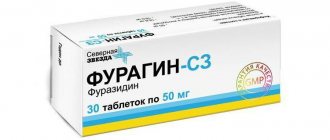The antibiotic Monural has been the gold standard in the treatment of cystitis in recent years. The drug is able to quickly eliminate most pathogenic microbes that cause inflammation of the bladder. The pharmacological properties of the medication allow it to be used only once a day. Moreover, a single dose is enough to eliminate symptoms and cure the disease. Monural for cystitis is well tolerated by the body and in most cases does not cause side effects. The advantages of the drug include the fact that it is approved for use in the treatment of children.
Monural
Monural is a modern broad-spectrum antibiotic drug.
- It is easily absorbed, enters the bloodstream almost immediately and quickly accumulates in the bladder.
- After just a couple of hours, the drug reaches the maximum concentration necessary to destroy pathogenic microorganisms.
- Monural is effective against many known gram-negative and gram-positive bacteria, including those that are resistant to other antibiotics.
Compound
The active ingredient of Monural is fosfomycin. The preparation contains saccharin, sucrose and tangerine or orange flavorings as excipients.
Release form
- The drug is available in the form of granular powder, from which you need to prepare a suspension for oral administration.
- The powder is packaged in sachets of 2-3 g. The package contains 1-2 sachets.
The average price of Monural 2 g is about 384-448 rubles, and the drug in 3 g bags costs approximately 469-528 rubles.
Monural's analogs
Analogs are drugs that contain the same active substance. In addition to Monural, there are a number of drugs whose active ingredient is fosfomycin. These include:
- Urophosphabol;
- Fosmicin;
- Urofoscin;
- Fosfomycin trometamol;
- Fosfomycin*;
- Fosfomycin sodium;
- Ecomural;
- Phosphoral Rompharm;
- Fosfomycin Esparma.
Preparations with other active ingredients in the composition, but having an effect similar to Monural, also deserve attention. Among them are the following:
- phytolysin is a herbal remedy that has an antimicrobial effect, available in the form of a paste;
- furagin is a domestic antibacterial drug in tablet form;
- furadonin is a medicine containing nitrofurantoin;
- nolitsin - antibiotic norfloxacin, taken twice a day, 1 tablet;
- palin - contains pipemidic acid, taken 1 tablet twice a day.
Operating principle
Monural has a bactericidal effect. The mechanism of action of the drug is to suppress the synthesis of bacterial cells at the very initial stage. As a result, further proliferation of bacterial microorganisms becomes impossible.
- In addition, the drug has an anti-adhesive effect, which manifests itself in preventing the adhesion of bacterial microorganisms to cellular receptors of the uroepithelium.
- The drug is bactericidal active against almost all bacteria of gram-positive and gram-negative forms.
- Monural quickly and highly effectively affects bacteria, especially those that cause infections in the lower genitourinary tract.
Compared to antibiotic drugs such as Norfloxacin or Cotrimoxazole, Monural has a pronounced effect on microorganisms such as Proteus, Escherichia coli and Klebsiella pneumoniae. The antibiotic destroys bacterial strains that produce β-lactamase. It is effective in the treatment of pathologies caused by pathogens resistant to other antibiotics from a number of fluoroquinolones and aminoglycosides, sulfonamides and quinolones, tetracyclines, nitrofurans, etc. Video review of the drug Monural:
General description of the drug
Monural or Fosfomycin is an antibiotic with a broad spectrum of action, belonging to the family of uroantiseptics. His main place of work is the urinary tract, so he actively fights inflammatory processes in them. Accordingly, the main indications for use relate to infectious processes in the genitourinary system.
The main active ingredient of the drug is fosfomycin trometamol, which by its chemical nature is a derivative of phosphonic acid. The antibiotic is produced in the form of granular powder for the preparation of a solution for oral use.
The antibiotic has several analogues with which it can be quite effectively replaced. These are drugs such as urofosabol, fosfomycin sodium, fosfomycin trometamol.
Indications
The main indications for the use of Monural are:
- Acute attacks of cystitis of bacterial origin;
- Nonspecific bacterial urethritis;
- Massive asymptomatic bacteriuria, even in pregnant women;
- Urogenital infections occurring during the postoperative period;
- For prophylaxis during surgical procedures and diagnostic transurethral procedures.
Monural is especially widely used for inflammatory lesions of the bladder. This pathology is characterized by very unpleasant symptoms, which significantly worsen the quality of life and bring patients a lot of discomfort and suffering. The advantage of Monural over other drugs is its ability not to inhibit growth, but to destroy bacterial microorganisms. The drug inhibits the synthesis of the bacterial wall, causing its development to stop and death to occur.
Many studies conducted in world-famous clinics confirm the highest effectiveness of the drug in the treatment of urological diseases and its speed of action at minimal doses.
This is a kind of pill for cystitis, which you only need to take once or twice to get rid of the pathology forever. The antibiotic has a powerful destructive effect on most known bacteria, which allows it to be used in the form of empirical therapy when the specific causative agent of the pathological process has not yet been identified and its sensitivity to the drug has not been determined.
The drug is almost completely eliminated through the renal system, which eliminates its accumulation in the intestines and the development of dysbacteriosis complications. And due to the short course, the development of resistance to Monural in bacterial microorganisms is also excluded. Even after a single dose, a stable concentration of the active ingredient is achieved.
Why an antibiotic?
Bladder-related infections require appropriate treatment. Conventional drugs are not enough here - you need powerful drugs, like antibiotics. They have impressive activity, thanks to which they are able to destroy huge colonies of pathogenic microorganisms. Correct use of such medications allows you to get rid of the infectious lesion in the shortest possible time. But if you take them incorrectly, this can result in negative consequences for the body.
When choosing a suitable antibiotic, you need to pay attention to a number of important parameters:
| Factor | Description |
| Efficiency | Microorganisms are distinguished by their diversity. To combat each individual type of pathogen, an appropriate antibiotic is required. To determine the type of pathogen and select an effective drug for it, it is necessary to conduct a microbiological analysis of urine. Only after this the disease is treated |
| Safety | As mentioned above, antibiotics have a significant effect on the human body. It is necessary to evaluate all the degrees of risk that the chosen product carries - the number of contraindications, toxic effects, etc. The drug must be safe for the patient |
| Price | The cost of the medicine also plays an important role. Expensive drugs will not always be more effective than cheap ones, since in the second case we are talking about analogues |
Instructions for use
The antibiotic is characterized by excellent tolerability in patients, as well as the absence of negative effects on the fetus, so it is allowed to be taken during pregnancy:
- For cystitis, adults take Monural 3 g once; if necessary, the dose can be repeated a day later. The contents of the sachet should be dissolved in 1/3 glass of water and drunk.
- For children over 5 years of age, a dosage of 2 g of the drug is indicated, also in a single dose.
- Pregnant women take the antibiotic according to a regimen similar to other adults, but it should only be prescribed by a doctor for vital indications, since the active substance of the drug is still able to penetrate the placenta. Although in the first trimester taking any medications (including Monural) is prohibited. But while breastfeeding, taking antibiotics is contraindicated.
Monural should be taken 2 hours before or after meals, because food slows down the absorption processes. Experts recommend that all categories of patients take an antibiotic at night, after emptying the bladder.
As a rule, one dose is enough per course. An additional dose may be prescribed a day after the first for recurrent infections of bacterial origin and severe pathology, for elderly patients, or in the absence of the expected therapeutic effect, which happens when the rules of administration are violated
To prevent urinary infections during urological interventions or diagnostic procedures, take Monural twice: the first time before the procedure 3 hours, and the second dose a day after it. The drug is also prescribed for the treatment of pyelonephritis, but with such a diagnosis, the dosage is selected individually by the treating specialist, and treatment is carried out in combination with other medications.
During pregnancy and lactation
During pregnancy, some women develop cystitis. Monural has proven itself well for the treatment of an inflamed bladder in pregnant women, since it does not cause the development of fetal pathologies.
The advantage of the antibiotic is that it can be taken once, while treatment with other drugs can last up to a week. Gynecologists note that patients tolerate this medication well, because it has almost no negative effects.
Monural should be used during pregnancy after consultation with a doctor. There are no studies describing the effect of the drug on the development of the child, but the ability of fosfomycin to pass through the placenta is known. So doctors prescribe Monural to pregnant women for cystitis only in extreme situations, when the result of treatment far exceeds the likely risk to the unborn child.
If a woman had cystitis before planning a pregnancy, then Monural may not help her. Its use will need to be combined with taking other medications.
During the first trimester of pregnancy, taking any medications is prohibited, this also applies to Monural. After all, it is at this time that the formation of the child’s internal organs begins.
In the second and third trimester, antibiotics are allowed to be taken. But you should strictly follow the instructions and observe the indicated dosage. The second and third trimester are relatively safe periods in which to begin treatment.
Breastfeeding women will have to stop breastfeeding while using the drug. Because fosfomycin passes into milk and can harm a newborn baby.
Side effects
Adverse reactions due to treatment with Monural are extremely rare, however, patients may experience:
- Allergies in the form of skin itching and rashes;
- Nausea and vomiting reactions;
- Diarrhea;
- Heartburn;
- In case of overdose, there is a high risk of diarrhea.
If side symptoms from the gastrointestinal tract appear, experts recommend increasing fluid intake, then the unpleasant symptoms will quickly disappear.
Contraindications
The antibiotic, despite such high effectiveness and relative safety, still has a number of contraindications:
- Monural should not be taken up to 5 years of age, since in such patients the development of the renal pelvis apparatus has not yet completed and the filtration functions are not fully performed.
- Women who are breastfeeding should not take antibiotics because they pass into breast milk.
- The drug should not be prescribed if there is hypersensitivity to fosfomycin and other components of the drug.
- Severe renal failure is also a contraindication for the use of antibiotics.
special instructions
The half-life of Monural is about 2-3 days, although its action begins within 3-4 hours after administration. This is manifested in a significant reduction in painful symptoms and dysuria. Monural should be prescribed with caution to diabetic patients, because the powder contains sucrose.
During antibiotic therapy with broad-spectrum drugs, antibiotic-associated colitis may develop, which will require specific treatment to eliminate.
It is not recommended to combine antibiotic treatment with metoclopramide and drugs based on it, as this leads to a significant decrease in the concentration of the drug in urine. Drinking alcoholic beverages is also prohibited during therapy. In the video about the use of the drug Monural during pregnancy:
Reviews
Both patients and specialists in the field of urology note the high therapeutic effectiveness and rapid action when taking Monural for the treatment of genitourinary infections. Patients note that just a few hours after taking the solution they felt a significant improvement. The undoubted advantage of this antibiotic is a short course of therapy and a minimal list of adverse reactions.
During therapy with Monural, a persistent, relapse-free effect is achieved, which can last up to a year. There are cases when the drug does not help, then a second dose is prescribed, usually this is enough to completely get rid of cystitis and other genitourinary infections, which has been repeatedly confirmed by patient reviews. If the patient has a complicated chronic form of genitourinary infection, then treatment should take a longer time and use other drugs.
To avoid problems with the treatment of various types of infectious lesions of the genitourinary system, it is necessary to contact a urologist at the first manifestations, and not self-medicate, bringing the pathology to a chronic form.











